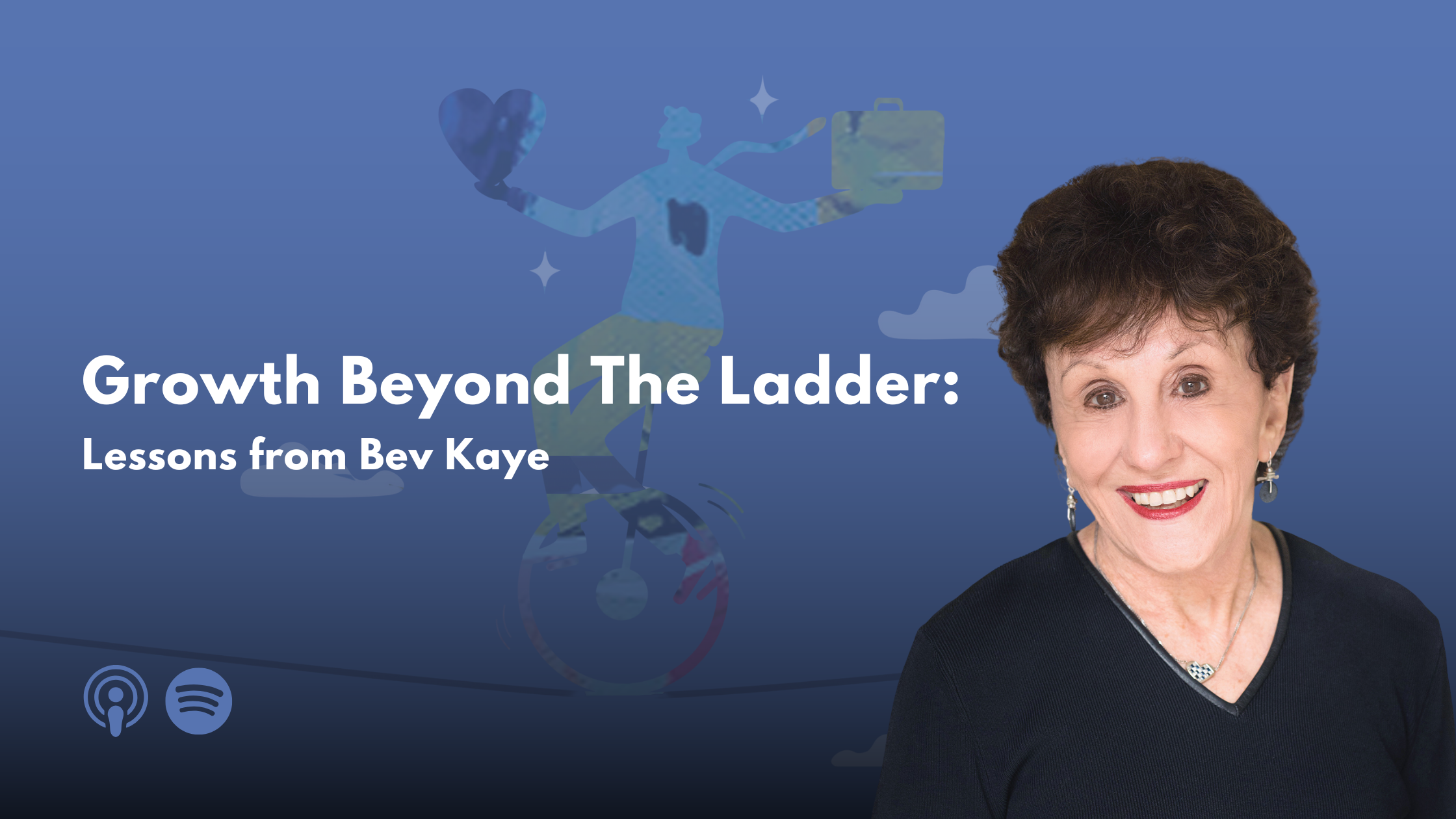On this episode of Meaningful Work Matters, we’re joined by Dr. Beverly (Bev) Kaye, a pioneer in the fields of career development, employee engagement, and retention. Over the course of nearly five decades, Kaye has helped organizations and leaders rethink how people grow at work. Her bestselling books include Up Is Not the Only Way (1982), Love ’Em or Lose ’Em: Getting Good People to Stay (1999, now in its 6th edition), and Help Them Grow or Watch Them Go (2012, with a new edition released in 2023). Her work has consistently made complex ideas simple, accessible, and practical for managers and employees alike.
Growth Beyond the Ladder
One of Kaye’s earliest contributions came with the idea that career growth is not just about climbing upward.
In Up Is Not the Only Way, she encouraged employees and managers to think of careers as kaleidoscopes rather than telescopes. Instead of aiming for one distant goal, people can shift perspectives, take on new challenges, or expand in lateral directions without leaving their current role. This idea foreshadowed today’s conversations around job crafting, a theme previously explored on the podcast with Rob Baker.
As Soren noted in their conversation, research on psychological well-being has shown that personal growth and development are essential not just for engagement but also for our overall health and longevity.
Growth isn’t a “nice to have.” It’s central to a meaningful and sustainable career.
Conversations That Signal Mattering
Kaye emphasized that the most powerful way leaders communicate you matter is through conversation. This can be as simple as noticing when someone lights up during a task and naming it: “I noticed your energy when you led that meeting. What about it excited you?”
The episode connects to past discussions on mattering, such as with Zach Mercurio, who underscored why feeling valued and adding value are essential, and Isaac Prilleltensky, who explored how mattering shows up as both being valued and contributing value.
Kaye builds on these ideas by stressing the micro-moments of noticing and saying what you see, which are gestures that turn ordinary interactions into signals of recognition and care.
Opportunity Minded vs. Opportunity Blinded
Another sticky concept Kaye introduced is the idea of being opportunity minded versus opportunity blinded.
Managers and employees alike can fall into the trap of overlooking possibilities right in front of them. Leaders who cultivate opportunity mindedness ask better questions: What do you love doing? What do you want more of?
By tuning into what lights people up, leaders can expand options, shape more fulfilling roles, and prevent disengagement.
The of ‘Stay Conversations’
In Love ’Em or Lose ’Em, Kaye popularized the practice of stay interviews - open conversations with employees about what keeps them engaged and what might cause them to leave. These conversations are often avoided because managers fear hearing requests they cannot grant.
Kaye’s advice is simple but profound: admit when you cannot deliver, keep the conversation going, and make space for honesty.
By doing so, leaders show that speaking up is always welcome, even if they cannot fulfill every request. This openness helps employees feel safe to share what matters most.
The Human Side of Growth
Kaye also acknowledged that growth has a dark side.
Too much development or overly passionate engagement can lead to burnout, especially if managers fail to notice the signs. This is particularly challenging in remote work settings, where leaders may miss visual cues. As Kaye pointed out, noticing requires intention, and saying what you see is often the simplest yet most overlooked leadership practice.
Key Takeaways
Growth is more than climbing the ladder. Careers can expand laterally, creatively, and through small shifts in perspective.
Conversations are the most powerful tool leaders have for retention and engagement. Saying “you matter” often comes down to noticing and naming.
Leaders can be opportunity minded by helping employees see choices and possibilities that may be hidden in plain sight.
Stay interviews and honest conversations prevent disengagement and build trust, even when leaders cannot meet every request.
Noticing is both simple and difficult, but it is the foundation of making people feel seen and valued.
Final Thoughts
Dr. Beverly Kaye’s legacy is built on deceptively simple truths: people want to matter, they want to grow, and they want to be noticed. Her work reminds us that meaningful work is all about creating spaces where people feel valued and have opportunities to thrive.
Leaders who learn to see, say, and support what makes their employees light up will retain talent and help them find genuine fulfillment at work.
Resources for Further Exploration
Explore Bev’s writing:
Up Is Not the Only Way (1982)
Love ’Em or Lose ’Em: Getting Good People to Stay (1999, 6th edition)
Help Them Grow or Watch Them Go (2012, 3rd edition 2023)
Learn more about Bev’s work here: https://bevkaye.com/





